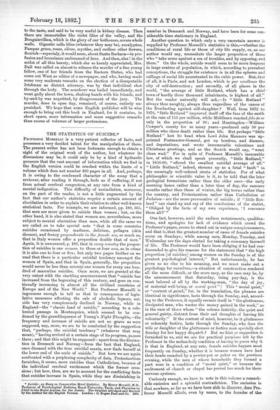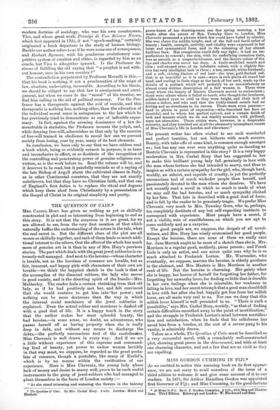THE STATISTICS OF SUICIDE.*
PROFESSOR Moaszmor is a very patient collector of facts, and possesses a very decided talent for the manipulation of them. The present writer has not been fortunate enough to obtain a sight of the original work of the author, but whatever its dimensions may be, it could only be by a kind of hydraulic pressure that the vast amount of information which we find in the English version could, be crushed within the limits of a volume which does not number 400 pages in all. And, perhaps, it is owing to the condensed character of the essay that a reviewer, after reading it through, feels as if suffering, if not from actual cerebral congestion, at any rate from a kind of mental indigestion. This difficulty of assimilation, moreover, on the part of the reader, is not a little augmented by the fact that our author's statistics require a certain amount of elucidation in order to explain their relation to other well-known statistical facts. For example, we are informed, pp. 189, 365, that men are more given to suicide than women ; but, on the other hand, it is also stated that women are, nevertheless, more subject to Mental aberration than men, while all the same we are called on to take special note "that in some countries suicides occasioned by madness, delirium, pellagra (skin disease), and frenzy preponderate in the female sex, so much so, that in Italy women offer a proportion double that of men." Again, it is announced, p. 189, that in every country the propor- tion of suicides is one woman to three or four men, as in crime it is also one to four or five ; but only two pages further on we read that there is a particular suicidal tendency amongst the women of Spain, and that in Spain, generally, the proportion would never be less than seventy-one women for every one hun- dred of masculine suicides. Once more, we are greeted at the very outset with the startling announcement that "suicide has increased from the beginning of this century, and goes on con- tinually increasing in almost all the civilised countries of Europe and of the New World." But Professor Morselli is ingenuous enough to tell us that in consequence of legis- lative measures affecting the sale of alcoholic liquors, sui- cide has very conspicuously declined in Norway, while in England—the "classic land of suicide," according to a cele- brated passage in Montesquieu, which seemed to be con- firmed by the grandiloquence of Young's Night Thoughts,—the frequency and increase of suicide are not so grave as were supposed, nay, more, we are to be comforted by the suggestion that, "perhaps, the suicidal tendency" (whatever that may mean)," having arrived at a certain stage of its progress, pauses there ; and that this might be supposed— apart from the diminu- tion in Denmark and Norway—from the fact that England, once diseased with the true suicidal mania, now finds herself at the lower end of the scale of suicide." But here we are again confronted with a perplexing complexity of data. Protestantism furnishes, it seems, more suicides than Catholicism, because of the individual cerebral excitement which the former occa- sions; but how, then, are we to account for the conflicting facts that suicides increase in Spain, while they are diminishing in • Suicide: an Essay on Comparative Moral Statistic*. By Henry Moraelli, M.D., Professor of Psychological Medicine, Royal University, Turin, and Physician-in- Chief to the Royal Asylum for the Insane. The Original Abridged and Revised by the Author for the English Vernon. London : C. Kege.n Paul and Co. 1881.
number in Denmark and Norway, and have been for some con- siderable time stationary in England.
Another question to which only a very uncertain answer is supplied by Professor Morselli's statistics is this,—whether the conditions of rural life or those of city life supply, or, as our author would say, necessitate the larger proportion of those who "take arms against a sea of troubles, and by opposing, end them." On the whole, suicide would seem to be more frequent in large centres of population, in which, according to prevalent conceptions, the struggle for existence is in all the spheres and callings of social life accentuated to the cubic power. But, first of all, it is Paris, and not London, which is par excellence the city of self-destruction ; and secondly, of all places in the world, "the average of little Rutland, which has a chief • town of hardly three thousand inhabitants, is highest of all." But the reader naturally will ask,—Is "little Rutland always thus naughty, always thus regardless of the canon of the Everlasting against self-slaughter ? Well, from 1872 to 1876, "little Rutland" improved itself off the face of the earth at the rate of 153 per million, while Middlesex enacted /do de se only in the proportion of 98; and Huntingdon—William Cowper's county for so many years—produced only 50 per million who chose death rather than life. But perhaps " little- Rutland " lost its bead when Lord John Manners was ap- pointed Postmaster-General, got up bonfires, and dinners,. and deputations, and wrote innumerable valentines and Christmas greetings, and as the Scotch would say, "went clean wild." For in spite of Professor Morselli's inexorable- law, of which we shall speak presently, "little Rutland," in 1856-60, "offered the smallest suicidal average of all." "Little Rutland," indeed, streams up as a fatal "fault" in the seemingly well-ordered strata of statistics. For of what philosophic or scientific value is it, to be told that the later geological formations rather than the older ones—the early morning hours rather than a later time of day, the summer months rather than those of winter, the big towns rather than the country, and Protestantism rather than Catholicism or Judaism— are the more provocative of suicide ; if "little Rut- land" can stand up and say of the conclusions of the statist,. "Obliged by the facts of my own experience, I renounce- them all P' " One fact, however, amid the endless restatements, qualifica- tions, and apologies for lack of evidence which crowd the Professor's pages, seems to stand out in unique conspicuousness,. and that is, that the greatest number of cases of female suicides.
occur on Sundays ; while among men, Monday, Tuesday, and- Wednesday are the days elected for taking a summary farewell of life. The Professor would have been obliging if he had con- descended to give his reasons for the statement that "the high proportion [of suicides] among women on the Sunday is of the- greatest psychological interest." But unfortunately, he has given us no clue to his meaning, and we must make out a psychology for ourselves,---a situation of construction rendered all the more difficult, or the more easy, as the case may be, by the announcement that Saturday, being pay-day, is the, most beloved of all by the working-man, "the day of joy, of material well-being, or moral quiet " ! This "moral quiet," or "content of „mind," for, in the translation, the phrases are- identical in significance, lasts through the Sunday, and, accord- ing to the Professor, it equally reveals itself in "the gluttonous,. dissipated man, who wastes the money gained in the week," as- in the case of those whom "the solemn festivity, the quiet and general gaiety, distract from their sad thoughts of leaving life voluntarily." If the content of mind, however, be it gluttonous or solemnly festive, lasts through the Sunday, why does the wife or daughter of the gluttonous or festive man specially elect Sunday for her happy dispatch ? But no hint or suggestion is furnished to us, and, we are for practical purposes left by the Professor in the melancholy condition of having to guess why it
is that in England, at any rate, female suicides happen most frequently on Sunday, whether it is because women have had their heads smashed by a pewter-pot or poker on the previous evening, while the men of whose households they formed a part were in a condition of "moral quiet," or because the excitement of church or chapel has proved too much for their- nervous systems.
Curiously enough, we have to note in this volume a remark- able omission and a splendid contradiction. The omission is.
that nowhere, so far as we have been able to discover, does Pro- fessor Morselli allude, even by name, to the founder of the modern doctrine of sociology, who was his own countryman, Vico, and whose great work, Principi di Una Seim= Nuova, which first appeared in 1725, if not "epoch-making," certainly originated a fresh departure in the study of human biology. Buckle our author refers to as if he were some one of consequence, and Herbert Spencer, with his ponderous evolutionary com- petitive system of creation and ethics, is regarded by him as an oracle, but Vico is altogether ignored. Is the Professor de- sirous of fulfilling the old saying that "a prophet is not with- out honour, save in his own country ?"
The contradiction perpetrated by Professor Morselli is this,— that his book is nothing, if not a proclamation of the reign of law, absolute, undeviating, inexorable. According to his thesis, we should be obliged to say that law is omnipotent and omni- present, but when we come to the " moral " of his treatise, we find him calling in the aid of political economy. For the Pro- fessor has a therapeutic against the evil of suicide, and this therapeutic is nothing less, nothing other, than the education of the individual moral sense in antagonism to the law which he has previously tried to demonstrate as one of inflexible supre- macy. In fact, against the seeming dominance of a law de- monstrable in statistics, the Professor mounts the pulpit, and, while denying free-will, admonishes us that only by the exercise of free-will trained in obedience to moral law can we prevent society from losing, year by year, many of its best elements.
In conclusion, we have only to say that we have seldom read a book which, being so evidently earnest in purpose, is so lame and inconclusive in effect, or so destitute of the recognition of the controlling and penetrating power of genuine religions con- viction, as is the work before us. Read the volume will be, and it deserves to be read, but it painfully reminds us of a saying of the late Bishop of Argyll about the cultivated classes in Italy, as in other Continental countries, that they are not exactly unbelievers, but that they have no Christian faith, and that one of England's first duties is to replace the ritual and dogmas which keep them aloof from Christianity by a presentation of the Gospel of Christ in its original simplicity and purity.



































 Previous page
Previous page